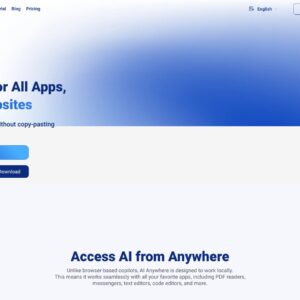Label Studio
Label Studio is an open-source data labeling tool designed to prepare training data for computer vision, natural language processing, speech, voice, and video models. It offers flexibility for labeling all types of data.
Description
how to use:
To use Label Studio, you can follow these steps:
1. Install the Label Studio package through pip, brew, or clone the repository from GitHub.
2. Launch Label Studio using the installed package or Docker.
3. Import your data into Label Studio.
4. Choose the data type (images, audio, text, time series, multi-domain, or video) and select the specific labeling task (e.g., image classification, object detection, audio transcription).
5. Start labeling your data using customizable tags and templates.
6. Connect to your ML/AI pipeline and use webhooks, Python SDK, or API for authentication, project management, and model predictions.
7. Explore and manage your dataset in the Data Manager with advanced filters.
8. Support multiple projects, use cases, and users within the Label Studio platform.
Core freatures:
Flexible data labeling for all data typesSupport for computer vision, natural language processing, speech, voice, and video modelsCustomizable tags and labeling templatesIntegration with ML/AI pipelines via webhooks, Python SDK, and APIML-assisted labeling with backend integrationConnectivity to cloud object storage (S3 and GCP)Advanced data management with the Data ManagerSupport for multiple projects and usersTrusted by a large community of Data Scientists
Use case:
Preparing training data for computer vision models
Preparing training data for natural language processing models
Preparing training data for speech and voice models
Preparing training data for video models
Classification of images, audio, text, and time series data
Object detection and tracking in images and videos
Semantic segmentation of images
Speaker diarization and emotion recognition in audio
Audio transcription
Document classification and named entity extraction
Question answering and sentiment analysis
Time series analysis and event recognition
Dialogue processing and optical character recognition
Multi-domain applications requiring various types of data labeling
FAQ list:







Reviews
There are no reviews yet.